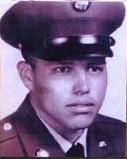Billy Walkabout (March 31, 1949 – March 7, 2007) is thought to be the most decorated Native American soldier of the Vietnam War. He received one Distinguished Service Cross (upgraded from Silver Star), one Bronze Star Medal, one Army Commendation Medal, and one Purple Heart.
Billy Walkabout | |
|---|---|
 | |
| Born | March 31, 1949 Cherokee County, Oklahoma, United States |
| Died | March 7, 2007 (aged 57) Montville, Connecticut, United States |
| Buried | |
| Allegiance | United States |
| Service | |
| Rank | |
| Unit | 58th Infantry 101st Airborne Division |
| Battles / wars | Vietnam War |
| Awards | Distinguished Service Cross Bronze Star Purple Heart Army Commendation Medal Ranger Tab. |
Background and family
editWalkabout was born on March 31, 1949, in Cherokee County, Oklahoma.[2] He was a citizen of the Cherokee Nation, belonging to the Blue Holly Clan, Anisahoni, and was the son of Warren Walkabout and Bobby Jean Chaudoin Walkabout.[3]
Military service
editWalkabout served as a combat infantryman in Vietnam, serving in Company F (LRP) ( 1 Feb 1969 became L co 75th Inf RGR ) 58th Infantry, which was attached to the 101st Airborne Division. Walkabout distinguished himself by exceptionally valorous actions on 20 November 1968 during a long range reconnaissance patrol southwest of Hue.
After successfully ambushing an enemy squad on a jungle trail, the friendly patrol radioed for immediate helicopter extraction. When the extraction helicopters[citation needed] arrived and the lead man began moving toward the pick-up zone[citation needed], he was seriously wounded by hostile automatic weapons fire. Sergeant Walkabout quickly rose to his feet and delivered steady suppressive fire on the attackers while other team members pulled the wounded man back to their ranks. Sergeant Walkabout then administered first aid to the soldier in preparation for medical evacuation. As the man was being loaded onto the evacuation helicopter, enemy elements again attacked the team.
Maneuvering under heavy fire, PFC Walkabout positioned himself where the enemy were concentrating their assault and placed continuous rifle fire on the adversary. A command-detonated mine ripped through the friendly team, instantly killing three men and wounding all the others. Although stunned and wounded by the blast, Sergeant Walkabout rushed from man to man administering first aid, bandaging one soldier's severe chest wound and reviving another soldier by heart massage. He then coordinated gunship and tactical air strikes on the enemy's positions. When evacuation helicopters arrived again, he worked single-handedly under fire to board his disabled comrades. Only when the casualties had been evacuated and friendly reinforcements had arrived, did he allow himself to be extracted. He retired as a second lieutenant.
Death
editHe suffered from complications arising from exposure to the Agent Orange defoliant used in Vietnam.[2] He was waiting for a kidney transplant and took dialysis three times a week. He died of pneumonia and renal failure in a hospital in Norwich, Connecticut, survived by his wife and several children from earlier marriages.
Walkabout was buried at Arlington National Cemetery, in Arlington, Virginia.[4]
He was honored in a portrait, Walkabout: A Warrior's Spirit, by Cherokee artist Talmadge Davis.
Notes
edit- ^ "Billy Walkabout, decorated American Indian veteran, dies at 57". USA Today. 2007-03-11. Archived from the original on 2011-06-22.
- ^ a b Billy Walkabout, decorated American Indian veteran, dies at 57. USA Today. March 11, 2007 (retrieved April 7, 2009)
- ^ "Interstate named in honor of Cherokee military hero". Cherokee Phoenix. 5 May 2010. Retrieved 2021-10-12.
- ^ "Burial Detail: Walkabout, Billy Bob (Section 66, Grave 59)". ANC Explorer. Arlington National Cemetery. (Official website).
References
edit- Obituary, Associated Press, March 12, 2007
- Billy Walkabout, decorated American Indian veteran, dies at 57, USA Today, March 11, 2007
- Obituary, Norwich Bulletin, March 11, 2007
- Mohegans salute 'warrior', Norwich Bulletin, March 12, 2007